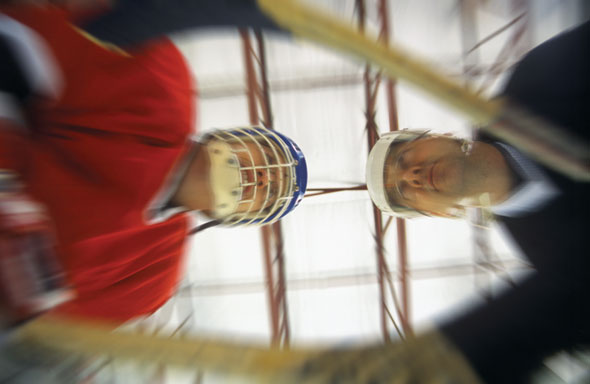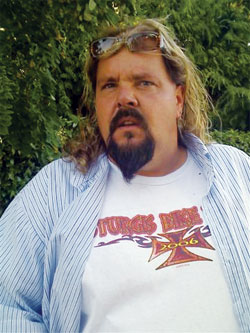 “If somebody had told me five years ago that I'd be a part of The Salvation Army in British Columbia promoting Christianity, I'd have beat the heck out of him,” declares Billy Smith. “God's taken me someplace I never knew I was equipped for.”
“If somebody had told me five years ago that I'd be a part of The Salvation Army in British Columbia promoting Christianity, I'd have beat the heck out of him,” declares Billy Smith. “God's taken me someplace I never knew I was equipped for.”
A Life of Addiction
“I was born in Saskatoon, into a family of addiction,” Billy says. “My father was an alcoholic, as my grandfather before him. Back on the Prairies, when I had a cold, they'd give me what they called a hot toddy—a little bit of whisky, hot water, lemon and honey. It didn't take me long to figure out that I enjoyed being sick.”
Though young Billy excelled in hockey, his love of alcohol prevented him from cultivating the kind of commitment needed to turn his natural skill into a sports career. “Alcohol came before anything,” he admits. “And from there, I started doing drugs and getting into trouble.”
In his early 30s, Billy decided to move to British Columbia for a new start. “I heard the work was good out here and the grass was greener,” he recalls. “I wanted to run away from my life. I thought if I changed my address, everything would be better. But it wasn't—not even close.”
Billy was soon introduced to crack cocaine to go with his other addictions. Before long, he'd lost everything, including his job installing custom granite countertops in Whistler. Destitute, Billy wound up at a Salvation Army shelter, where a compassionate staffer transferred him to The Salvation Army Harbour Light Treatment Centre in Vancouver.
“I had nothing, I'd lost everything,” Billy says. “And that's when I met Jack. Meeting him was the best thing that ever happened to me.”
Newfound Belief
 Now a sports consultant to such faith-based groups as the More Than Gold coalition, Jack O'Halloran was then in charge of The Salvation Army's B.C. Sports Ministry. As part of his mandate, he'd organized a floor-hockey night for the men in the Harbour Light facility, in a gymnasium across the street. Under Jack's patient guidance, the floor-hockey games grew from just one or two men in attendance to more than 20 participants, including men from other treatment centres.
Now a sports consultant to such faith-based groups as the More Than Gold coalition, Jack O'Halloran was then in charge of The Salvation Army's B.C. Sports Ministry. As part of his mandate, he'd organized a floor-hockey night for the men in the Harbour Light facility, in a gymnasium across the street. Under Jack's patient guidance, the floor-hockey games grew from just one or two men in attendance to more than 20 participants, including men from other treatment centres.
Jack would play right alongside them, patiently showing the men, by his own example, how to compete as friends without coming to blows. “We never had an incident,” marvels Billy. “No fights, no violence … nothing.”
Throughout his troubles, Billy never lost his love of sports and, from the beginning, he had always been an eager participant in the floor-hockey events. As time went on, however, he grew into a leadership role.
This was not of his own volition. “I was quite content to be a goalie, like that other Billy Smith, the goaltender for the New York Islanders,” Billy smiles. “But right before the game, Jack would call and say he was ill and wouldn't be able to attend. And he'd ask if I could run the game that evening.”
Soon, Billy found himself in charge of the evening matches on a regular basis. It took him a few weeks to realize that Jack had never been sick at all. He'd just used that as an excuse to make Billy step up and take charge.
“I don't know what made Jack single me out,” confesses Billy. “I'm a big man with long hair and tattoos all over my body. Life for me was black and white, I was very outspoken and my language was salty. I made most truckers look and sound like choirboys! But Jack saw something in me I didn't realize existed. He believed in me when I didn't believe in myself.”
“Full Circle”
With the new responsibilities came a growing awareness. “I always knew God existed,” says Billy. “But now through the hockey games, through seeing how Jack treated people with respect and courtesy, I realized God was telling me something that I hadn't understood. Before, I never cared if I knocked someone down in a game. Now I'd be the first to reach out my hand and see that they were not hurt. I found a compassion I never had, and I found God. It's truly awesome!”
Now clean and a graduate of the treatment program, Billy is the shipping and receiving manager at Harbour Light. Sports, of course, still figure prominently in his life and he now organizes the floor-hockey league himself. “I've come full circle,” states Billy. “If we can reach people through sports, maybe we'll be able to show them that there's an opportunity for a better life.”









Leave a Comment